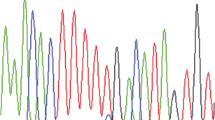Background. Abnormalities of the tumor suppressor gene p16 have been reported in a variety of human tumors but are rare in pancreatic carcinoma except for cancer cell lines and xenografts. Their clinicopathological significance remains unknown. The purpose of this study was to examine immunohistochemical and genetic alterations of p16 in primary pancreatic carcinoma tissues and to investigate the relation between abnormalities of p16 and clinicopathological parameters to elucidate their clinicopathological significance. Methods. We investigated p16 expression in 60 pancreatic carcinoma cases by immunohistochemistry using a monoclonal antibody clone G175-405. In addition, we analyzed genetic alterations of the p16 gene using DNA extracted from microdissected tissue of pancreatic carcinoma, by polymerase chain reaction, nonradioisotopic single-strand conformation polymorphism (non-RI-SSCP), DNA sequencing, and hypermethylation analyses using restriction enzymes. We compared the abnormalities of p16 alterations with clinicopathological parameters to elucidate their significance. Results. On immunohistochemical study, staining for p16 protein was strongly positive in 22 (37%) of 60 pancreatic carcinoma cases, weakly positive in 24 (40%), and negative in 14 (23%). In contrast, p16 mutations were recognized in 9 (15%) of the 60 pancreatic carcinoma cases. The incidence of p16 mutations was 2 (9%) in 22 cases of pancreatic carcinoma with strongly positive staining, 4 (17%) in 24 with weakly positive staining, and 3 (21%) in 14 with negative staining. Hypermethylation of p16 was detected in the two pancreatic carcinoma cases with weakly positive staining, although homozygous deletions were not found in any case. There was no significant correlation between the expression of p16 protein and any of the clinicopathological parameters. However, there was a tendency for the tumor to be larger in patients with decreased expression of p16 protein than in those with normal expression levels. In contrast, the tumor was significantly larger and the survival period significantly shorter for patients with pancreatic carcinoma with p16 mutation or hypermethylation than for those with pancreatic carcinoma with an intact p16 gene (P ≪ 0.05). Conclusions. These findings suggest that p16 alterations may participate in the aggressiveness of pancreatic carcinoma.
Similar content being viewed by others
Author information
Authors and Affiliations
Rights and permissions
About this article
Cite this article
Ohtsubo, K., Watanabe, H., Yamaguchi, Y. et al. Abnormalities of tumor suppressor gene p16in pancreatic carcinoma: immunohistochemical and genetic findings compared with clinicopathological parameters. J Gastroenterol 38, 663–671 (2003). https://doi.org/10.1007/s00535-003-1119-6
Received:
Accepted:
Issue Date:
DOI: https://doi.org/10.1007/s00535-003-1119-6




